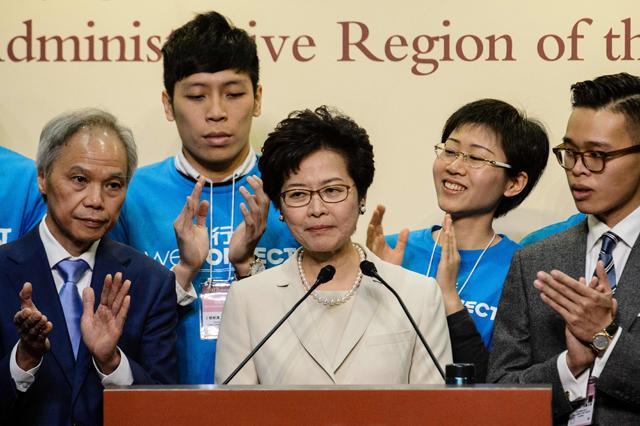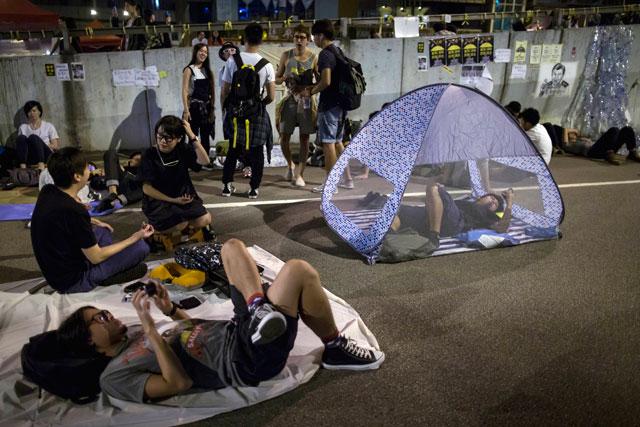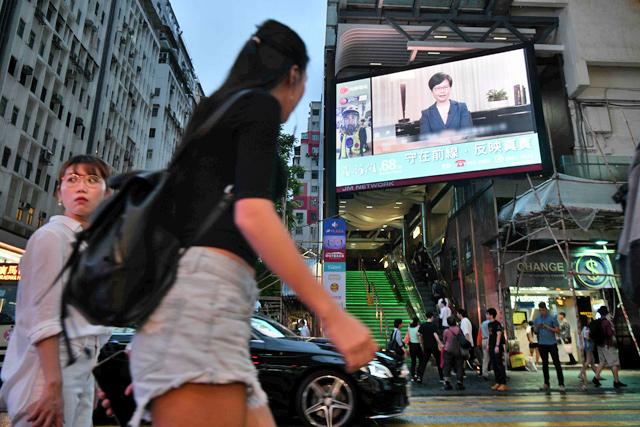You are here
Hong Kong chooses new Beijing-backed leader amid political tension
By Reuters - Mar 26,2017 - Last updated at Mar 26,2017

Hong Kong's new Chief Executive Carrie Lam (centre) reacts at a press conference after she won the Hong Kong chief executive election in Hong Kong on Sunday (AFP photo)
HONG KONG — A Beijing-backed civil servant, Carrie Lam, was chosen to be Hong Kong's next leader on Sunday amid accusations that Beijing is meddling and denying the financial hub a more populist leader perhaps better able to defuse political tension.
Lam, who will become Hong Kong's first female chief executive when she takes office on July 1, won 777 votes compared with 365 for her closest rival, former financial secretary John Tsang, who polls show is more popular.
There were several invalid protest ballots including one that carried an obscenity.
"Hong Kong, our home, is suffering from quite a serious divisiveness," Lam said in a victory speech.
"My priority will be to heal the divide and to ease the frustration, and to unite our society to move forward."
Lam also pledged to follow through on election promises including introducing a "two-tier" profits tax, reducing tax to spur research and development, tackling the high cost of housing by increasing land supply and boosting education spending.
She also promised to defend the rule of law and freedom of expression as integral to underpinning prosperity.
"Hong Kong needs new thinking," she said.
Tensions
Some scuffles broke out outside the voting centre between protesters and police, who used metal barricades to keep the demonstrations well away.
The activists denounced Beijing's "interference" amid widespread reports of lobbying of voters to back Lam, rather than Tsang.
Some protesters chanted "I want universal suffrage" and unfurled yellow umbrellas, a symbol of the civil disobedience "umbrella movement", when the result was announced.
"Lies, coercion, whitewash," read one banner. A big yellow banner calling for full democracy was hung from the Lion Rock peak overlooking the city.
"The central government has intervened again and again," said Carmen Tong, a 20-year-old student. "It's very unjust."
Hundreds of Lam's supporters waved Chinese flags and cheered inside and outside the venue after her win.
Many, including opposition democrats, fear Lam will stick to the tough policies of staunchly pro-Beijing incumbent Leung Chun-ying, who ordered the firing of teargas on pro-democracy protesters in 2014 and who was not seen to be defending Hong Kong's autonomy and core values.
"She doesn't have a strong foundation, nor will she have a honeymoon after she's elected," said political scientist Ivan Choy.
"But whether she will further divide society we still have to wait and see what she does, whether she will continue the approach of Leung."
China's Hong Kong and Macau affairs office congratulated Lam, saying she should not disappoint the people and should seek to "comprehensively unite all sectors of society", strengthen development, and "work hard to forge a new situation", the official Xinhua news agency said.
Some city residents see China's creeping interference in business, media, politics, academia and the judiciary as tarnishing the city's international business allure.
The detention in 2015 of five Hong Kong booksellers who sold material critical of Beijing also dismayed many residents.
Hong Kong had been presented with a reform package, offering the possibility of a direct vote for this leadership race, though only of candidates essentially pre-screened by Beijing. The blueprint was vetoed in 2015 by pro-democracy lawmakers as "fake" Chinese-style democracy.
Political and social divisions have led to some legislative and policy-making paralysis and the stalling of major projects, including a cultural hub and high-speed rail link to China.
While Hong Kong's proximity to China has been a boon, bringing investment and spending, businesses have also faced growing competition from mainland firms in sectors like services and property.
Housing prices, now among the world's highest, are widely seen to have been pushed up by a wave of buying from rich Chinese, intensifying anti-mainland China sentiment.
Related Articles
Pro-democracy protests in Hong Kong have handed China's communist leadership a thorny political dilemma.
Hundreds of student activists camped overnight at major protest sites in Hong Kong as the democracy movement sought to re-gather momentum after the government called off talks on defusing unrest in the global financial hub.
HONG KONG — Hong Kong's leader on Wednesday bowed to a key demand of pro-democracy protesters following three months of unrest, announcing t













